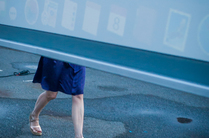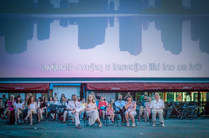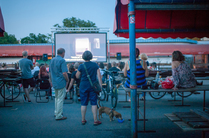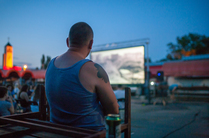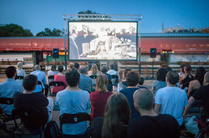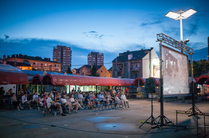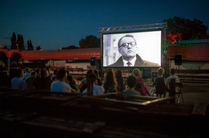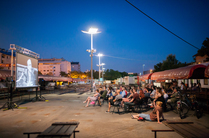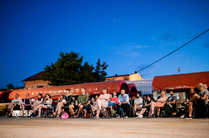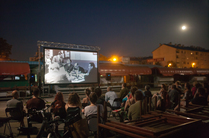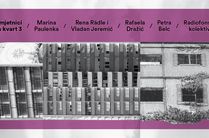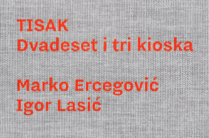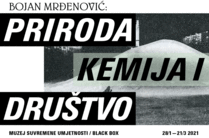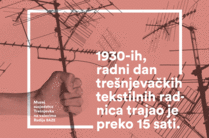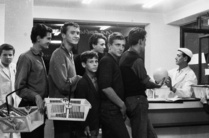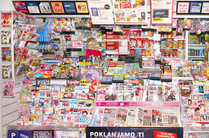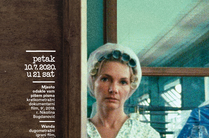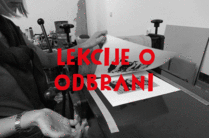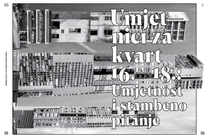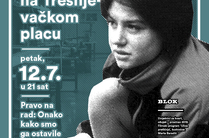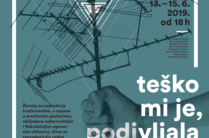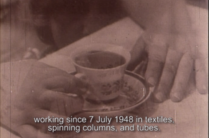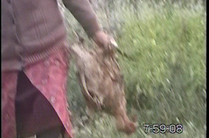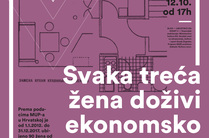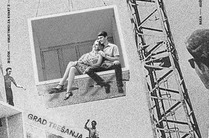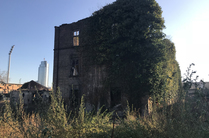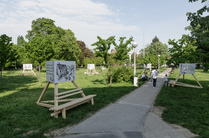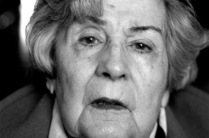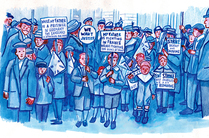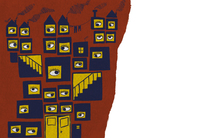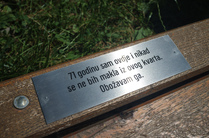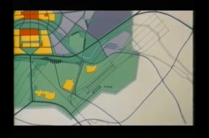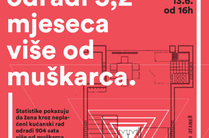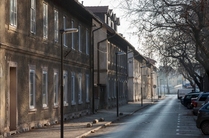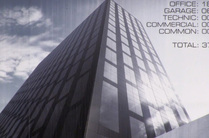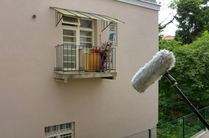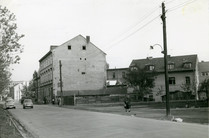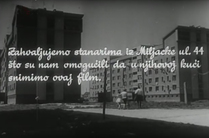PETRA BELC: FILM PROGRAMME "HOUSING ON FILM"
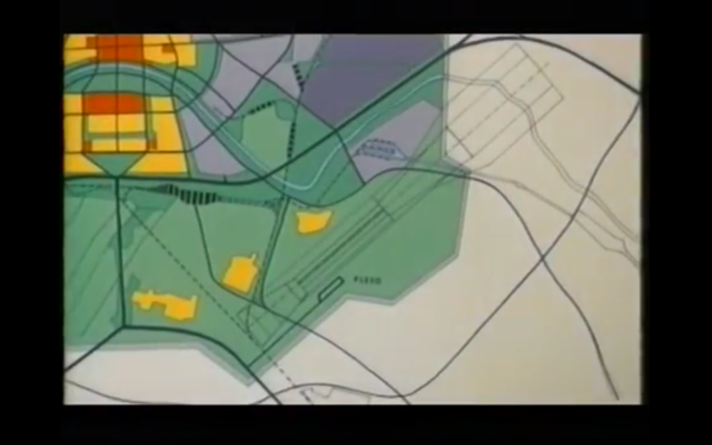
CURATOR: Petra Belc
The third screening of "Politics of Representation"
Saturday, July 15, 2017, at 9 p.m. at Trešnejvački plac
Housebound (B. Marsch, 200/2004), documentary, 8'
I only want you to love me (R. W. Fassbinder, 1976), feature film, 104'
Although different in styles, genres and periods, a short-length documentary Housebound by Bernhard Marsch and feature film I only want you to love me by R. W. Fassbinder communicate on several common levels, where the most obvious one is the testimony on the autobiographical efforts of the author to face segments of their own lives, fractured through their relationship with the concept of living space.
Housebound follows the director on a small farewell journey through the labyrinth of his apartment in Cologne, which, since his moving in in 1984, has transformed into a treasure trove of almost everything that has passed through his hands over the course of those 17 years. This merzbau cathedral, which he built with obvious love for film, Marsch commented on in the dialogue with Werner Enke three years after the filming — responding to the witty, sincere and honestly astonished questions of this Munich actor and screenwriter — and their conversation became the sound background of the final version of the film.
"My grandmother would say, it ended up bad for you, boy. I've always told to you; do not go to Munich, do not go to the big city. Go to work in the bank, find some honest craft so you do not end up badly", Enke wittily comments on Marsch's life circumstances or troubles and threatens him in a fatherly manner that he should have his ears pulled. Enke's comments are in gloomy harmony with Fassbinder's television drama I only want you to love me, in which the author brings the masochism of love and pressure that the civilian mores of the middle-class tailored by measures of consumer capitalism exert on the worker to a kind of psychoanalytic climax. The main hero is the young son of Bavarian entrepreneurs who persistently and self-destructively tries to buy the love of his surrealistically sadistic parents and his future wife, exhausting himself firstly in the construction of the parental home, and then equipping his suburban apartment in Munich, where he works on a construction site and is waiting, with his unemployed wife, for his first child to be born. The film was made after a true story from the novel For Life (Lebenslänglich, Protokolle aus der Haft) by Klaus Antes and Christiane Ehrhardt, and because of the extent by which Fassbinder adapted this story to his own interests, putting the cruelty of mother and childhood traumas into focus, many filmologists and critics have begun to agree on the fact that this is one of his most personal films.
Thematizing the 'advanced state of disorder' into a sort of film auto-exorcism devoted to the design of living space, Marsch and Fassbinder humorously and painfully oppose the traditional and destructive, intuitive individual and schematically learned, transforming them into a safe field of research and artistic film.
The second screening of "Politics of Representation"
Saturday, July 8, 2017, at 9 p.m. at Trešnjevački plac
The Cathedral (K. Kästner, 2013), documentary, 15'
Hands over the City (F. Rosi, 1963), feature film, 105'
The urbanization of modern China, based on financial speculation and considered a 'royal way' to modernity, and the political-economic malversations in the context of spatial expansion of Naples in the middle of the last century, are the themes of the second part of the film programme dedicated to the way of presenting housing in film.
At the beginning of the 2000s, on the profitable wave of exploitation of ore, China began with the urbanization of the border area with Mongolia, where, today the widely-known and impressive 'ghost town' - Kangbashi has emerged. Allegedly designed after the model of Beijing, the magnificently overbuilt Kangbashi has for a long time remained almost completely uninhabited; on the one hand, the residential square meters have become the only logical investment for a part of the population that benefited from regional natural wealth, while on the other, the construction contractors, after the 2011 market breakdown, decided to keep the real estates in order to have their prices rise in the future. German director Konrad Kästner overlapped the shots of the empty city of cinematographer Eve Katharine Bühler, with the text of the short story by Michael Ende into an award-winning movie essay The Cathedral. It is a poetic and meditative reflection on the economic backbone of this Chinese city crucified in the space between stagnation and development.
The uncritical belief in the power of money and God is also present in the neo-realistic political drama of Italian director Francesco Rosi Hands over the City, for which the author won the Golden Lion of Venice in 1963. The after-war Naples is a place of a continuous fight against corruption and crime in the structures of the city government, which Rosi accurately describes as an ideal and complex polygon for the fruitful collaboration of influential construction speculators and a network of mayor's people, united in the struggle for profit and power.
Away in miles and decades, the Chinese "ghost town" and Naples of the 1960s are approaching each other as two versions of a disturbing portrait of the capitalist city.
Petra Belc
THE FIRST SCREENING OF "POLITICS OF REPRESENTATION"
FRIDAY, JUNE 30, 2017, 8 P.M.
BAZA, ADŽIJINA 11
This year's film programme starts by the projection of short films at BAZA, followed by a discussion with director Vanja Vascarac.
The optimism that followed the development of the society in Yugoslavia was articulated in particular by means of filmmaking. In the middle of the last century a film company Zagreb film was founded and significant achievements were made in the field of art feature films, advertising and animated films, forming at the same time and with almost equal enthusiasm, film representations of Zagreb. By communicating the development of the city through visual mediation of this sustainable enterprise, the city authorities convey that "7,300 new comfortable flats" were completed between 1953 and 1957, while that number mounted to 26,000 newly built residential units in the period between 1963 and 1967. The network of bus and tram traffic is expanding, new roads, schools and municipal public health centers are being built, which, simultaneously with investments into the modernization of medical equipment, provide the citizens with medical care. In 1963, a slope lift on mountain Medvednica was launched, and soon the Zagreb airport got a new terminal.
This information is presented in short-length promotional films through a carefully measured rhythmic structure and a thoughtful change (experimental and popular) of background music and scenic noises and sounds. The camera is equally floating over the city as it enters the factory halls, supermarkets and neighbourhood libraries, while the whole is enriched with atmospheric shots of details and a montage play of big plans of repetitive patterns of residential blocks or production lines. The film also features a narrator who helps the audience to clearly understand the "great thoughts of a thoughtful and unique plan" for "the next 30 years", by which the city authorities have been strategically planning the development of Zagreb. Real dwellings grow in front of the viewers’ eyes, while the citizens of Zagreb enter to sit in real slope lifts and in broad plans descend the snow slopes from the top of Sljeme.
Fifty years later, promotional films intended for the presentation of projects of strategic importance to the City of Zagreb reveal a different picture: the present is unclearly set between fiction and reality, and the past seems to be deprived of factual foundations and recalled in accordance with one's nostalgic impressions, big plans conceal a wider picture of reality while the promised future is reduced to fantasy renderings and 3D projections of non/knowledgeable techno-futurism.
A comparative view of old and new promotional films devoted to the development of Zagreb and its capital investment projects open this year's film programme, opening up the key issues about their representation policies. What production models have replaced the former co-operation with state-owned companies such as Zagreb Film today, how they reflect on the film production market and are they really a (long-term) better solution? In what ways do the film makers form narratives of urban and industrial propaganda films, who decides on their layout and content, and what are the customer briefs based on? How important is the directorship skill, the degree of innovation and production quality of the film, and how much public money is invested in their development? The film "festivity of work and prosperity in a former country of peasants" from the middle of the last century and today's film-mediated urban visionaries, apart from exploratory-viewing pleasure, are the basis for discussing the crisis issues of the social state institutions, the consequences of the free market and the peculiar connections of private production investments and public city propaganda.
Petra Belc
The programme is supported by the Croatian Audiovisual Centre.
